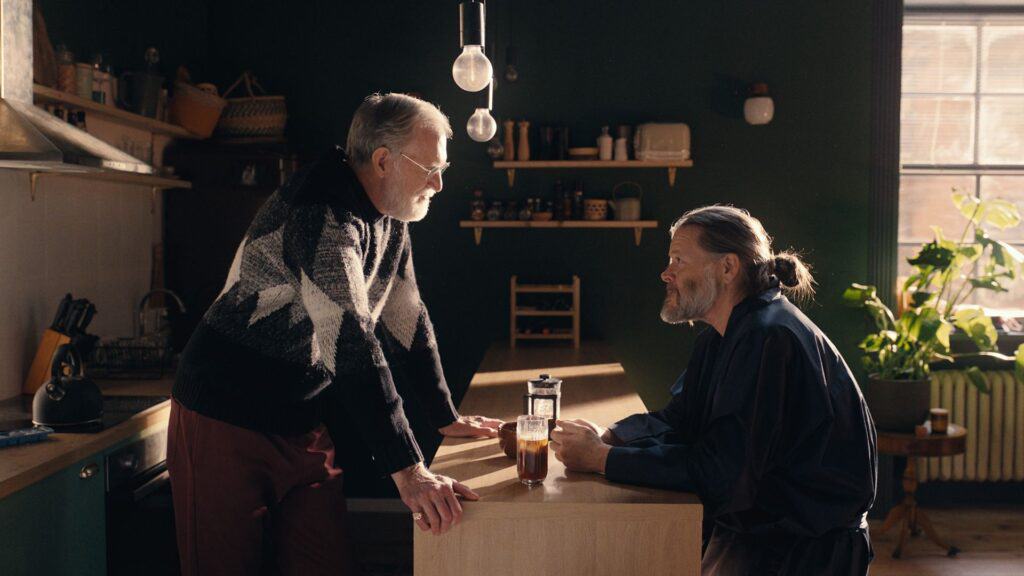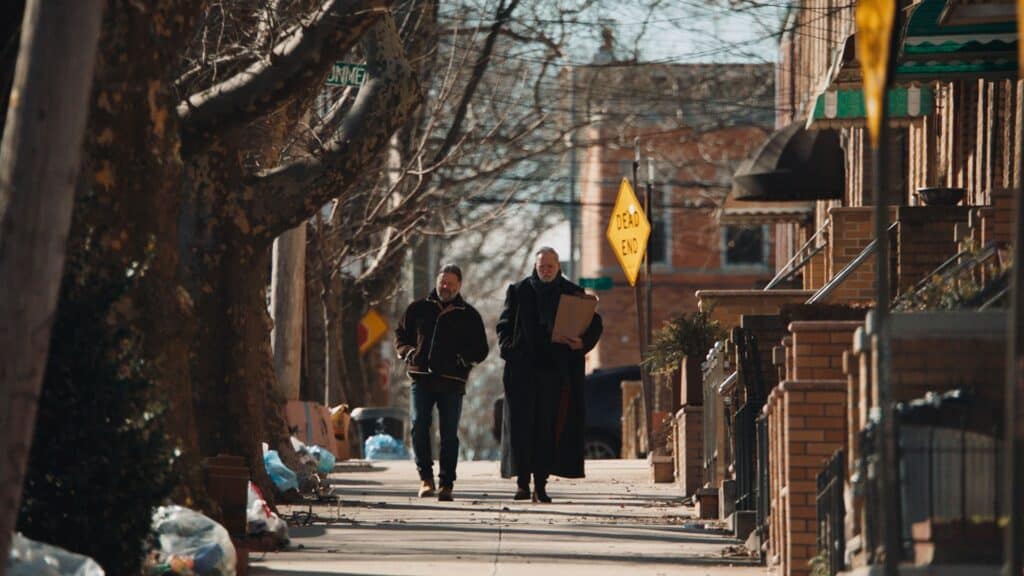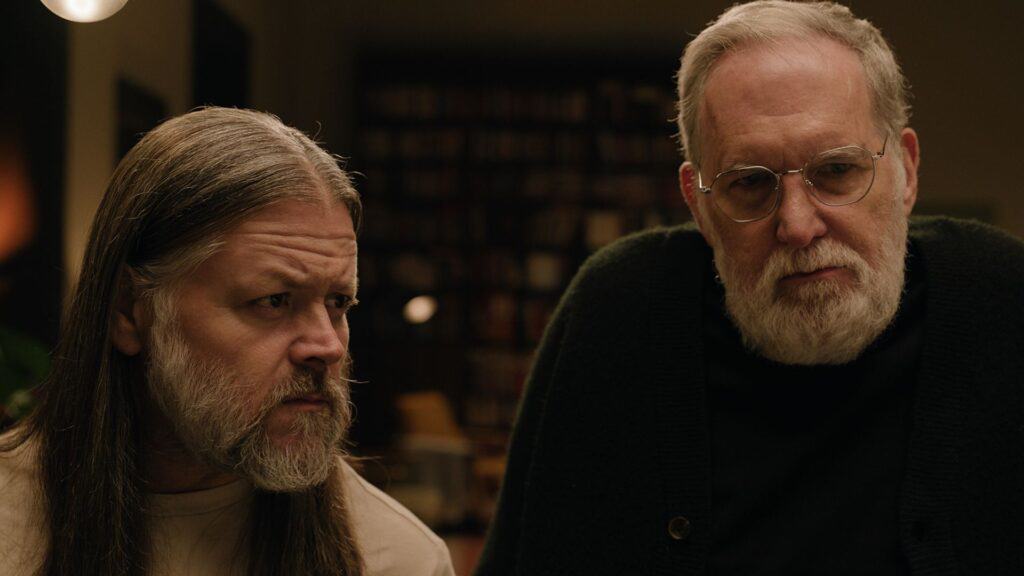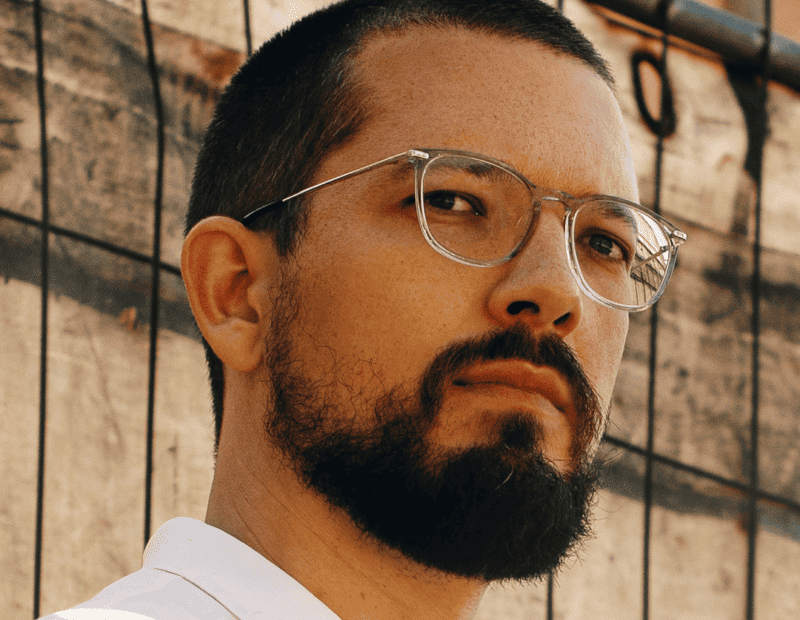I saw The Writer at the Black Nights Film Festival. It’s the fourth feature by Romas Zabarauskas. After the film, I was able to talk to the director about the film. It’s a story about two former lovers from the Soviet days who now reunite in New York after one of them, who moved there, wrote a book about the affair. The Writer is reviewed here. In some ways, our conversation was informed by the same difference of approach as the characters in the film.
How did this project begin? Is it a screenplay written for the screen, or was it first performed in the theatre?
It was an original screenplay for the film. I was impacted by Russia’s intensified terror in Ukraine last year. I realised that in our region, we often tried to move beyond the past, but current events made me think that we still need to assess it to move forward. Russia’s terror today is not unlike the Soviets 50 years ago, and that occupation still has an impact on us today. I also wanted to make a film outside the European public funding arthouse system to make a different kind of film. It was interesting to make a film in English and to allow ourselves to experiment with an American style. It’s even a bit of a sitcom style.
So, the interiors were shot in Lithuania, but the exteriors were shot in New York?
Yes, the interiors were shot in a studio in Lithuania. Since the film is a German-US co-production, it’s not eligible for funding from Lithuania. Because of that, the aesthetics became more American as well.
Do you think that had an impact on the script too? That it became more American in style? I’m not saying it did; I just wonder how you see it.
For this film, I’m inspired by different filmmakers who are exploring the art of conversation, like Alain Resnais, Éric Rohmer, and John Cassavetes.
Resnais? That’s one of my favourite directors of all time. This film made me think of Resnais.
Really? That’s awesome! Yes, some of his later films are much like chamber pieces and studio-bound. The one that stands out for me is Mélo. He calls himself a metteur en scène as a theatre director rather than an auteur. It is interesting with the relationship between theatre and cinema. I don’t shy away from my theatre connection. However, I feel that our film works as cinema for a particular reason because we have close-ups. That allows the audience to really feel what the characters are thinking; at least, that was the idea.

And you have some pretty conspicuous camera movements.
That is true. I always want to consider the notion of contrast. When the conversation goes deeper emotionally, we just stick with the characters and go into close-ups, not seeking any originality because what is important there is their feelings. But to achieve some contrast and make it more interesting, we have some visual experimentation in between, reminding the viewer that they are watching a piece of art in a Brechtian way.
I also thought about Resnais in the dancing scene in the way it is staged with the lights coming on like on stage.
That’s so interesting; that’s actually really cool. Because the film world is so vast, it’s very inspiring that I thought about those influences and you recognised them.
There’s also Rohmer, whose films are talkative in a different way.
Yes, in the sense that he allows the dialogue to unfold, and sometimes it can seem trivial. There are discussions about everything in his films. From art to politics, and he allows the talk to delve in different directions. I like to do that too because I think that this is a big part of our lives. This is what we do as people discuss politics and art and get angry about it. (laughing)
The dialogue in the film does not feel so theatrical, often more naturalistic. Was that an important part of the process with your three co-writers?
It’s not always a conscious decision. We don’t talk specifically about how theatrical it should be, but it can be quite intuitive. Still, I think the dialogue feels authentic. My all-time favourite film is All that Heaven Allows. Of course, it’s a very melodramatic film, but when I watch it and rewatch it, I find the dialogue realistic and very true. That was the kind of truth I focused on.
How did you pick the actors?
It was vital that they would have chemistry together. Of course, the conversation is based on the differences, both politically but also in their means of expression. It was important to find actors that would bring truth to that. I found Bruce [Ross] when I was casting in New York. Then we continued the casting online, and I found Jamie [Day] in Virginia.

Did you have an extended shooting period?
It was quite short. We shot one day in New York and then around eight days in the studio in Lithuania. We spent a considerable amount of time rehearsing. We actually rehearsed for one week in New York.
With the actors only or the camera movements as well?
There were only the actors, which was a great opportunity to see what worked and what didn’t. Then, in Lithuania, we did more rehearsals, eventually also with the camera. For me, rehearsals are a very important part of the process.
Interview with Romas Zabarauskas becomes sober
You must have thought about My Dinner With Andre.
Sure
In that film, the characters can irritate the spectator. I had similar feelings here. Then comes the line that I felt was a pivotal moment in the film: “Now, the conversation became sober”. From there on, it feels more real in a way, or am I over-interpreting that?
No, I don’t think so. Of course, from a plot point of view, it refers to the fact that he prefers not to drink anymore. The film gets more serious there, but there is also a bit of self-irony. The whole film is a bit of an experiment exploring the art of conversation. Still, they are already having a discussion, but this is when the conversation starts to get down to the essentials.

The two characters, Kostas and Dima, have different approaches to life and politics. Kostas is more pragmatic, whereas Dima is more idealistic. The latter is also younger. He talks about being vegan now and other things.
Kostas is more academic and more interested in structural changes. Dima believes in the importance of personal choice. His choices of not drinking and becoming a vegan are metaphors for that. I’m leaning towards Dima’s side. Incidentally, I’ve been a vegan for nine years. Of course, we need to acknowledge the need for structural change, but that can only happen if more people take these small personal steps and then create… awareness is a stupid word, but something to that effect.
The question is how Dima and people like him regard themselves in that situation.
It can be interpreted in different ways. The viewer will choose who to side with, Kostas or Dima, and we also had that diversity among the four writers. I think that is why it feels real, and both perspectives are given some weight. Some people will feel that the truth is somewhere in between. It is always a very safe position to say there’s truth on both sides. That’s why I’m kind of being brave and siding with Dima a bit more because I feel, yes. he is idealistic about personal change. On the other hand, he is realistic and says that personal change is something that we can all control.
If we return to cinematic things, how did you approach the cinematography? You said that the close-ups were important, but how did you decide on when and where the camera movements would be used?
We wanted to have a contrast to the simplicity of those close-ups I mentioned earlier. Also, remind the viewer that they are watching a film.
Those camera movements are a bit unusual for a chamber piece like this, but they’re very refreshing.
For me, it’s also the thing to allow ourselves to experiment and make an American film. There is a fantasy linked to American cinema, and shooting in a studio is part of that experience, so we dug into that.
